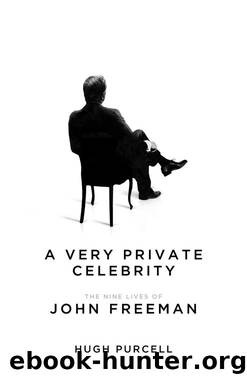A Very Private Celebrity by Hugh Purcell

Author:Hugh Purcell [Hugh Purcell]
Language: eng
Format: epub
ISBN: 9781849549455
Publisher: Biteback Publishing
Published: 2015-02-14T16:00:00+00:00
George VI and the Chief Captain (Churchill) had just received the ovation of the crowd at Buckingham Palace. Leonard Woolf, who was in the editor’s chair that week, was furious: ‘It [the editorial] is full of the slants, snides, sneers and smears that communists and fellow travellers habitually employ as means for building a perfect society.’18
During the war years the strongest patriots could be communists because the common enemy was fascism. A number of New Statesman staff worked secretly for the Political Warfare Executive (PWE) writing propaganda for dissemination into Nazi-occupied countries. Prominent among them was Richard Crossman, who was dubbed ‘a master of psychological warfare’, and Aylmer Vallance’s job was to ensure they did not give away military secrets. But during the Cold War that followed, the enemy was the Soviet Union and its communist satellites in eastern Europe, so allegiances were severely tested. On which side of the street did Vallance walk between 1945 and 1955? The jury is still out. Evidence that it was on the west: he kept his military rank of lieutenant colonel in his passport until his death, which must have provided some sort of cover, and he travelled behind the Iron Curtain frequently using a travel agency in north London, Gateway Tours, that was rumoured to be money-laundered by MI6. Evidence that it was on the east: he was a huge admirer of Yugoslavia in particular, named his son ‘Tito’, and several of his articles had a pro-communist bias. C. H. Rolf, who shared a New Statesman office with him and happened also to work part-time for the police, offers this verdict:
It seems likely enough that he was playing a fairly devious game, using the New Statesman with the knowledge of the Intelligence Department to plant useful items of pro-allied propaganda, but also planting, under cover of the two-way prestige this gave him, ‘fellow travelling’ material about war theatres like Yugoslavia. This was a source of constant friction; and the commonly-heard accusation that the New Statesman was a fellow-travelling paper was due not only to Kingsley’s ambivalence about Russia, but also to Aylmer’s stealthy insistence on putting in, deliberately too late for censorship or amendment, extreme statements about eastern Europe.19
Download
This site does not store any files on its server. We only index and link to content provided by other sites. Please contact the content providers to delete copyright contents if any and email us, we'll remove relevant links or contents immediately.
| Arms Control | Diplomacy |
| Security | Trades & Tariffs |
| Treaties | African |
| Asian | Australian & Oceanian |
| Canadian | Caribbean & Latin American |
| European | Middle Eastern |
| Russian & Former Soviet Union |
The Secret History by Donna Tartt(16656)
The Social Justice Warrior Handbook by Lisa De Pasquale(11493)
Thirteen Reasons Why by Jay Asher(7801)
This Is How You Lose Her by Junot Diaz(5797)
Weapons of Math Destruction by Cathy O'Neil(5046)
Zero to One by Peter Thiel(4834)
The Myth of the Strong Leader by Archie Brown(4795)
Promise Me, Dad by Joe Biden(4455)
Beartown by Fredrik Backman(4433)
Stone's Rules by Roger Stone(4422)
How Democracies Die by Steven Levitsky & Daniel Ziblatt(4412)
The Fire Next Time by James Baldwin(4350)
100 Deadly Skills by Clint Emerson(4085)
A Higher Loyalty: Truth, Lies, and Leadership by James Comey(4038)
Rise and Kill First by Ronen Bergman(4020)
The David Icke Guide to the Global Conspiracy (and how to end it) by David Icke(3891)
The Farm by Tom Rob Smith(3878)
Secrecy World by Jake Bernstein(3788)
The Doomsday Machine by Daniel Ellsberg(3737)
